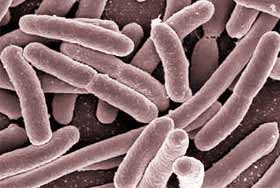 Now, before you grab your stomach and start to wretch a little bit at the thought of E. Coli bacteria being used to produce biofuels, listen just a bit to the rest of the story. Researchers at UCLA have discovered that they can use E. Coli bacteria (Escherichia coli) with glucose to produce higher chain alcohols for biofuels.
Now, before you grab your stomach and start to wretch a little bit at the thought of E. Coli bacteria being used to produce biofuels, listen just a bit to the rest of the story. Researchers at UCLA have discovered that they can use E. Coli bacteria (Escherichia coli) with glucose to produce higher chain alcohols for biofuels.
These higher chain alcohols such as isobutanol have distinct advantages over ethanol. Ethanol has lower energy density than gasoline so must be mixed with gasoline in order to bring up the octane level of the fuel. Ethanol also tends to be corrosive as it absorbs water from its surroundings.
Higher branch chain alcohols, however, do not readily absorb water and retain energy densities close to that of gasoline with similar octane numbers, so there will be no need to mix the two. UCLA has licensed the E. Coli biofuel technology to Gevo Incorporated of Pasadena, California who will develop a commercial version of this biofuel.
Since high gasoline prices are already giving many consumers a bellyache, turning to E. Coli for relief may seem counterintuitive, but it just may be what the doctor ordered.
Leave a Reply
You must be logged in to post a comment.